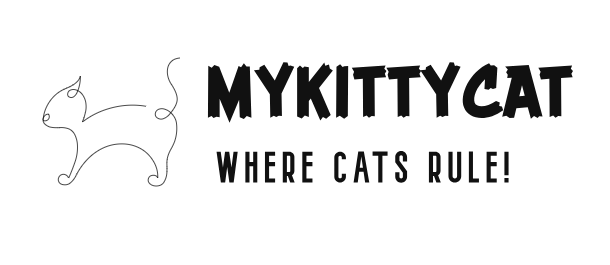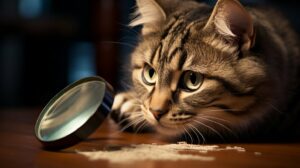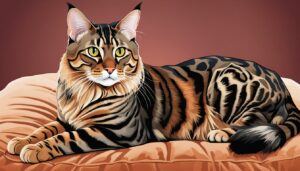As a cat parent, I understand the importance of providing my furry friend with the best care possible. One crucial aspect of their well-being is ensuring they receive the essential nutrients they need for optimal health. In this article, we will explore the top 10 nutrients that are vital for your cat’s overall health and well-being.
Key Takeaways:
- Omega-3 fatty acids are crucial for your cat’s skin and coat health.
- Probiotics support digestive health and strengthen your cat’s immune system.
- Vitamin B complex promotes energy levels and overall health.
- Glucosamine and Chondroitin aid in maintaining joint health, especially in older cats.
- Milk thistle helps support liver function in cats.
Omega-3 Fatty Acids for Skin and Coat Health
In order to maintain your cat’s skin and coat health, it’s important to incorporate omega-3 fatty acids into their diet. These essential nutrients play a crucial role in keeping your cat’s skin moisturized, reducing inflammation, supporting joint health, and lowering the risk of heart disease.
You can provide omega-3 fatty acids to your cat through supplements such as fish oil or by including foods rich in omega-3s, such as salmon and tuna, in their diet. These natural sources of omega-3s not only provide the necessary nutrients but also add variety to your cat’s meals, making them more enjoyable. Remember to consult with your veterinarian before introducing any new supplements or making significant changes to your cat’s diet.
Omega-3 fatty acids can significantly improve your cat’s overall skin and coat health, resulting in a shiny and lustrous coat. They can also help alleviate dry skin and itching, reducing the discomfort your cat may experience. Additionally, omega-3s have anti-inflammatory properties, which can benefit cats with allergies or skin conditions like dermatitis.
The Benefits of Omega-3 Fatty Acids for Cats
Omega-3 fatty acids offer a wide range of benefits for your cat’s health, including:
- Improved skin health and decreased itching
- Promotion of a healthy and shiny coat
- Reduced joint inflammation and improved mobility
- Support for a healthy heart and cardiovascular system
- Enhanced immune function and reduced risk of certain diseases
By ensuring your cat receives an adequate amount of omega-3 fatty acids, you can help support their overall well-being and improve their quality of life. Remember to consult with your veterinarian for personalized advice on your cat’s specific dietary needs and the appropriate dosage of omega-3 supplements.
Probiotics for Digestive Health and Immune Support
When it comes to maintaining your cat’s overall health, taking care of their digestive system and immune system is of utmost importance. That’s where probiotics come in. These beneficial bacteria are known to support a healthy gut and boost your cat’s immune function.
Probiotics work by promoting the growth of good bacteria in your cat’s gut, which helps to balance the delicate ecosystem in their digestive system. This can be especially beneficial for cats with digestive issues such as diarrhea or constipation. By adding probiotics to your cat’s diet, you can help regulate their bowel movements and promote better digestion.
Not only do probiotics support digestive health, but they also play a crucial role in enhancing your cat’s immune system. A large portion of your cat’s immune cells reside in their gut, and a healthy gut microbiome is essential for optimal immune function. Probiotics help strengthen the gut barrier, making it harder for harmful bacteria to invade and cause infections.
There are various ways to incorporate probiotics into your cat’s diet. You can opt for specially formulated probiotic supplements designed for cats, which come in powder or capsule form. Another option is to choose cat food that contains added probiotics. Before starting your cat on any new supplements or diet changes, it’s always a good idea to consult with your veterinarian for personalized advice.
The Benefits of Probiotics for Cats:
- Improved digestive health
- Enhanced immune function
- Regulated bowel movements
- Reduced risk of digestive issues
“Probiotics are a great addition to your cat’s diet for maintaining a healthy digestive system and supporting their immune function. I have seen many cats benefit from probiotic supplementation, especially those with sensitive stomachs or weakened immune systems.”
| Probiotic Strains | Benefits |
|---|---|
| Lactobacillus acidophilus | Aids in the breakdown of lactose and production of lactase |
| Bifidobacterium animalis | Improves digestion and nutrient absorption |
| Enterococcus faecium | Supports a healthy balance of gut bacteria |
| Saccharomyces cerevisiae | Helps reduce the risk of diarrhea and digestive upsets |
Adding probiotics to your cat’s diet can make a significant difference in their digestive health and overall well-being. Keep in mind that probiotics are not a replacement for proper veterinary care, so it’s essential to work closely with your veterinarian to determine the best probiotic regimen for your cat’s specific needs.
Vitamin B Complex for Energy and Overall Health
When it comes to keeping our feline friends healthy and full of energy, ensuring they receive the right nutrients is key. One essential group of nutrients for cats is the vitamin B complex. From energy production to maintaining healthy skin and coat, the B vitamins play a crucial role in supporting your cat’s overall health and well-being.
The vitamin B complex consists of several individual vitamins, including B1 (thiamine), B2 (riboflavin), B3 (niacin), B5 (pantothenic acid), B6 (pyridoxine), B7 (biotin), B9 (folate), and B12 (cobalamin). Each of these vitamins has its own unique functions, but together they work synergistically to support various bodily processes in your cat.
The B vitamins are essential for energy production in your cat’s body. They play a crucial role in converting food into usable energy, which is important for all cellular functions, including muscle contraction and nerve signaling.
In addition to energy production, the B vitamins also contribute to the health of your cat’s skin and coat. Biotin, in particular, is known for its role in maintaining the health and strength of your cat’s fur and nails. It helps prevent dryness, brittleness, and flakiness, ensuring your cat’s coat remains soft, shiny, and healthy.
| Vitamin | Function | Food sources |
|---|---|---|
| Vitamin B1 (thiamine) | Supports proper nervous system function | Meat, fish, eggs |
| Vitamin B2 (riboflavin) | Aids in energy production and growth | Dairy products, liver, leafy greens |
| Vitamin B3 (niacin) | Helps convert food into energy | Chicken, turkey, fish |
| Vitamin B5 (pantothenic acid) | Supports hormone and cholesterol production | Organ meats, avocados, legumes |
| Vitamin B6 (pyridoxine) | Aids in protein metabolism and red blood cell production | Poultry, fish, bananas |
| Vitamin B7 (biotin) | Maintains healthy skin and coat | Eggs, liver, nuts |
| Vitamin B9 (folate) | Important for cell division and DNA synthesis | Leafy greens, legumes, liver |
| Vitamin B12 (cobalamin) | Essential for nerve function and red blood cell production | Meat, fish, dairy products |
To ensure your cat receives an adequate amount of the B vitamins, look for high-quality cat foods that include these nutrients. If you have any concerns about your cat’s vitamin B intake or suspect a deficiency, consult with your veterinarian. They can guide you on the appropriate supplementation or dietary changes to support optimal health and energy levels in your feline companion.
Glucosamine and Chondroitin for Joint Health
As our beloved feline companions age, they may start experiencing joint issues and mobility problems. Joint health is crucial for their overall well-being and quality of life. Thankfully, there are supplements available that can help support their joints and alleviate discomfort. Two such supplements are glucosamine and chondroitin, which are often used in combination for maximum effectiveness.
Glucosamine is a natural compound found in the cartilage of animals, including cats. It plays a vital role in maintaining the health and integrity of the joints. Chondroitin, on the other hand, is a component of cartilage that helps cushion the joints and absorb shock. When used together, glucosamine and chondroitin can promote cartilage repair, reduce inflammation, and improve joint function.
To provide these benefits to your cat, you can find glucosamine and chondroitin supplements specifically formulated for feline use. These supplements come in various forms, such as chewable tablets or flavored liquids, making it easier to administer to your cat. It’s important to note that while these supplements can be beneficial for cats with existing joint issues, they can also be used as a preventive measure to maintain joint health in younger cats.
Benefits of Glucosamine and Chondroitin for Cats:
- Promote cartilage repair
- Reduce joint inflammation
- Improve joint function
- Alleviate joint discomfort
- Support overall mobility and quality of life
By incorporating glucosamine and chondroitin supplements into your cat’s daily routine, you can help support their joint health and keep them active and comfortable as they age. However, it’s always best to consult with your veterinarian before introducing any new supplements to your cat’s diet.
| Glucosamine and Chondroitin Supplements for Cats | Key Features |
|---|---|
| Product A | Contains high-quality glucosamine and chondroitin |
| Product B | Formulated with additional joint-supporting ingredients |
| Product C | Easy-to-administer liquid formula |
| Product D | Veterinarian-recommended brand |
Milk Thistle for Liver Support
When it comes to maintaining your cat’s overall health, it’s important not to overlook the well-being of their liver. The liver plays a critical role in filtering toxins from the body and aiding in digestion. To support your cat’s liver health, one beneficial supplement to consider is milk thistle.
Milk thistle is an herb that has been used for centuries due to its liver-protective properties. It contains a compound called silymarin, which has antioxidant and anti-inflammatory effects. These properties help to promote liver cell regeneration and protect against damage caused by toxins and inflammation.
Adding milk thistle to your cat’s diet can be particularly beneficial for cats on long-term medications, as certain medications can have a negative impact on the liver over time. Additionally, cats that are at risk for liver issues, such as those with diabetes or obesity, can also benefit from the liver-supporting effects of milk thistle.
| Milk Thistle Benefits for cats: |
|---|
| Supports liver cell regeneration |
| Protects against liver damage from toxins |
| Reduces inflammation in the liver |
| Aids digestion and detoxification |
It’s important to note that while milk thistle can be beneficial for cats, it’s always best to consult with your veterinarian before adding any new supplements to your cat’s diet. They can provide guidance on the appropriate dosage and ensure that milk thistle is safe and suitable for your cat’s individual needs.
Incorporating milk thistle into your cat’s wellness routine can help support their liver health and overall well-being. By taking proactive steps to care for your cat’s liver, you can contribute to their longevity and ensure they enjoy a healthy and happy life.
Digestive Enzymes for Improved Digestion
When it comes to your cat’s digestion, ensuring that they can properly break down and absorb nutrients is essential for their overall health and well-being. Digestive enzymes play a crucial role in this process by helping to break down food into smaller, more easily digestible components. These enzymes are naturally produced in your cat’s pancreas, but some cats may not produce enough on their own. Supplementing their diet with digestive enzymes can help improve digestion, reduce the likelihood of stomach upset, and enhance nutrient absorption.
There are various types of digestive enzymes that can benefit your cat, including proteases, amylases, and lipases. Proteases help break down proteins, while amylases aid in the digestion of carbohydrates, and lipases assist with the breakdown of fats. By including a digestive enzyme supplement in your cat’s diet, you can help ensure that they are receiving the necessary enzymes to support optimal digestion.

When choosing a digestive enzyme supplement for your cat, it’s important to consider their specific dietary needs and any existing digestive issues they may have. Consult with your veterinarian to determine the appropriate dosage and formulation for your cat. Additionally, it’s important to introduce the supplement gradually and monitor your cat’s response to ensure they tolerate it well.
Incorporating digestive enzymes into your cat’s diet can have numerous benefits, including improved nutrient absorption, reduced gastrointestinal discomfort, and enhanced overall digestion. By supporting your cat’s digestive health, you can help them maintain optimal well-being and enjoy a happy, healthy life.
Taurine for Heart and Eye Health
When it comes to ensuring your cat’s overall health and well-being, taurine plays a crucial role in supporting their heart and eye health. Taurine is an essential amino acid that cats require in their diet as they cannot produce it naturally in sufficient quantities. This nutrient is vital for maintaining a healthy cardiovascular system and proper eye function, making it an important addition to your cat’s nutritional regimen.
Taurine deficiency in cats can lead to serious health issues, including dilated cardiomyopathy (DCM), a condition that affects the heart’s ability to pump blood effectively. Cats with low taurine levels may exhibit symptoms such as lethargy, poor appetite, and even heart failure. Additionally, taurine is vital for maintaining good vision in cats, as it contributes to the health of the retina and prevents conditions like retinal degeneration.
Fortunately, ensuring your cat receives an adequate amount of taurine is relatively easy. Many high-quality commercial cat foods contain taurine, but it’s essential to check the labels to ensure sufficient levels. If your cat has specific heart or eye health concerns, your veterinarian may recommend taurine supplementation. Additionally, feeding your cat a balanced diet that includes taurine-rich protein sources such as chicken, fish, and liver can help meet their taurine needs naturally.
The Benefits of Taurine for Cats:
- Promotes a healthy cardiovascular system
- Supports proper eye function and prevents retinal degeneration
- Plays a crucial role in maintaining overall energy levels
“Taurine is an essential nutrient for cats, and ensuring your cat receives enough taurine is essential for their heart and eye health.”
By prioritizing taurine as part of your cat’s dietary needs, you can help protect their heart and maintain optimal vision. Regular vet check-ups can also help identify any potential taurine deficiencies and guide you in providing the right amount of this vital nutrient for your beloved feline friend.
Coenzyme Q10 for Energy Production and Heart Health
When it comes to supporting your cat’s energy production and heart health, Coenzyme Q10 is a valuable nutrient to consider. Coenzyme Q10 (CoQ10) is an antioxidant that plays a crucial role in energy production within the body’s cells. It helps convert food into energy, which is essential for your cat’s overall vitality and well-being.
Moreover, CoQ10 has been shown to promote heart health in cats. As your cat ages, its natural CoQ10 levels decline, which can impact heart function. Supplementing your cat’s diet with CoQ10 can help support its energy levels and maintain a healthy heart.
It’s important to note that while CoQ10 is beneficial, it should be used under the guidance of a veterinarian. They can help determine the appropriate dosage and monitor your cat’s response to the supplement. Additionally, it’s crucial to choose a high-quality CoQ10 supplement specifically formulated for cats, as other versions may contain additives that could be harmful to feline health.
The Benefits of Coenzyme Q10 for Cats
Coenzyme Q10 offers numerous benefits for cats, primarily in the areas of energy production and heart health. Here are some key advantages:
- Enhances energy production: CoQ10 aids in the production of adenosine triphosphate (ATP), which is the energy currency of cells. By supporting ATP synthesis, CoQ10 helps ensure your cat has the energy it needs for daily activities.
- Promotes cardiovascular health: CoQ10 has antioxidant properties that can help protect the heart from oxidative stress. It also supports the heart’s ability to pump blood efficiently, helping to maintain cardiovascular health.
- Supports overall well-being: By promoting energy production and heart health, CoQ10 contributes to your cat’s overall well-being, helping them live a happy and active life.
How to Incorporate Coenzyme Q10 into Your Cat’s Routine
When considering adding CoQ10 to your cat’s routine, it’s essential to consult with your veterinarian. They can assess your cat’s specific needs and recommend an appropriate dosage. Your veterinarian may also suggest a blood test to check your cat’s CoQ10 levels before starting supplementation.
CoQ10 supplements for cats are typically available in capsule or liquid form. These supplements should be administered according to the veterinarian’s instructions, usually mixed with food to ensure easy consumption. It’s important to follow the recommended dosage and monitor your cat for any potential side effects.
In conclusion, Coenzyme Q10 is a valuable nutrient for promoting energy production and heart health in cats. By incorporating this antioxidant into your cat’s routine under veterinary guidance, you can help support their overall well-being and ensure they lead a vibrant and active life.
Cranberry for Urinary Tract Health
When it comes to your cat’s urinary tract health, cranberry can be a valuable ally. Just like in humans, cranberry contains compounds that help prevent harmful bacteria from attaching to the bladder wall, reducing the risk of urinary tract infections in cats. By incorporating cranberry supplements into your cat’s diet, you can help support a healthy urinary system and prevent recurring infections.
Cats prone to urinary tract issues can benefit greatly from the power of cranberry. These supplements provide an extra layer of protection for your cat’s urinary tract, ensuring that they stay comfortable and free from infections. By regularly including cranberry in your cat’s routine, you can take proactive steps in maintaining their overall urinary tract health.
Choosing high-quality cranberry supplements specifically formulated for cats is essential. These supplements are designed to meet your cat’s unique needs, providing the right dosage and concentration of cranberry extract. Always consult with your veterinarian before introducing any new supplements into your cat’s diet, as they can provide further guidance tailored to your cat’s individual health and condition.







